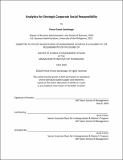| dc.contributor.advisor | Jacob Cohen. | en_US |
| dc.contributor.author | Samaniego, Ponce Ernest. | en_US |
| dc.contributor.other | Sloan School of Management. | en_US |
| dc.date.accessioned | 2020-09-03T17:45:36Z | |
| dc.date.available | 2020-09-03T17:45:36Z | |
| dc.date.copyright | 2020 | en_US |
| dc.date.issued | 2020 | en_US |
| dc.identifier.uri | https://hdl.handle.net/1721.1/127073 | |
| dc.description | Thesis: S.M. in Management Studies, Massachusetts Institute of Technology, Sloan School of Management, May, 2020 | en_US |
| dc.description | Cataloged from the official PDF of thesis. | en_US |
| dc.description | Includes bibliographical references (pages 27-28). | en_US |
| dc.description.abstract | Often organized as disconnected philanthropic activities independent from core corporate strategy, the potential that Corporate Social Responsibility (CSR) can play in gaining competitive advantage for firms have largely been untapped. One of the challenges in unlocking the strategic advantages of CSR lies in measuring results and connecting outcomes to key business priorities. The application of data analytics can support CSR practitioners in overcoming this challenge. By adopting CSR analytics, practitioners can more transparently measure the impact of their activities, identify underlying relationships with business goals, and utilize data to make strategic choices that contribute to corporate strategy. This research focuses on the case of Wayfair, one of the largest e-commerce companies in the world. In support of the firm's corporate goal of improving human resource outcomes, analytics strategies have been developed to describe, predict, and prescribe CSR interventions. These strategies impact the five dimensions of employee engagement: employee satisfaction, employee identification, employee commitment, and employee loyalty. This research study aims to encourage firms to increase focus and investments on the adoption of analytics in CSR. By doing so, firms can achieve business goals and contribute to sustainable development. | en_US |
| dc.description.statementofresponsibility | by Ponce Ernest Samaniego. | en_US |
| dc.format.extent | [iii] 28 pages | en_US |
| dc.language.iso | eng | en_US |
| dc.publisher | Massachusetts Institute of Technology | en_US |
| dc.rights | MIT theses may be protected by copyright. Please reuse MIT thesis content according to the MIT Libraries Permissions Policy, which is available through the URL provided. | en_US |
| dc.rights.uri | http://dspace.mit.edu/handle/1721.1/7582 | en_US |
| dc.subject | Sloan School of Management. | en_US |
| dc.title | Analytics for strategic corporate social responsibility | en_US |
| dc.type | Thesis | en_US |
| dc.description.degree | S.M. in Management Studies | en_US |
| dc.contributor.department | Sloan School of Management | en_US |
| dc.identifier.oclc | 1191819420 | en_US |
| dc.description.collection | S.M.inManagementStudies Massachusetts Institute of Technology, Sloan School of Management | en_US |
| dspace.imported | 2020-09-03T17:45:36Z | en_US |
| mit.thesis.degree | Master | en_US |
| mit.thesis.department | Sloan | en_US |
